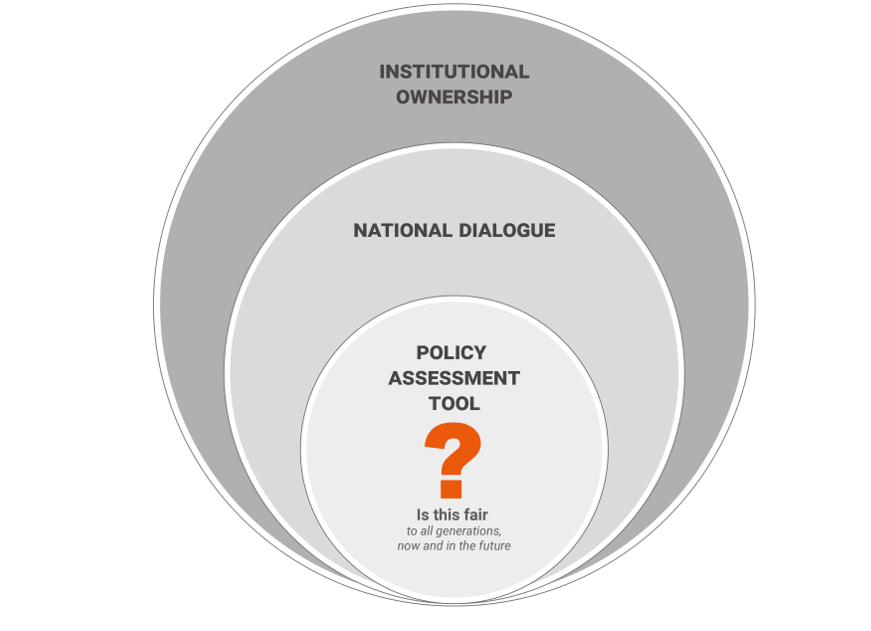Shining a light on how today’s decisions affect future generations: introducing a policy framework to activate intergenerational solidarity around EU Green Deal Transition and other long-term policies.
Over the past decade, concerns about intergenerational fairness have climbed up the priority ladder. Last year we established an Intergenerational Fairness Observatory that helps decision-makers act in ways that are more intergenerationally fair within communities, countries, regions, and global systems. Intergenerational fairness centres on the idea that responsible policymaking protects the rights of future generations and future citizens. The principle emerged to ensure that the costs and benefits of societal changes, like that of the green transition, are distributed fairly between current and future generations. And policymakers, politicians, and citizens are looking for solutions for strengthening solidarity between generations.
We are excited to announce the publication of Building a Coalition for Intergenerational Fairness in the European Green Deal, a policy brief about building intergenerational solidarity around the Green Deal and the climate transition. We did this in close collaboration with the Open Society European Policy Institute and with the support of everyone who contributed to their reflections and time in the roundtables and interviews. The brief identified three key recommendations in order to integrate the principle of intergenerational fairness into institutions and decision-making processes:
- appointing an institutional champion for intergenerational fairness in the EU;
- integrating explicit consideration and assessment of intergenerational fairness into the European semester plans, Next Generation Funds disbursement, and the Conference for the Future of Europe;
investing in building a community and knowledge resource to support interested citizens, businesses, politicians and civil societies across the EU (and beyond).
Based on a Intergenerational fairness policy assessment framework
Since 2018 we have been on the question of how to get policy-makers to engage with intergenerational fairness. This research has resulted in a Framework for intergenerational policy assessment that has been commissioned by the Calouste Gulbenkian Foundation. The framework is based on:
- the best and most recent practices in policy assessment, risk management and strategic foresight;
- it is inspired by successful international experiences, from countries like Japan, New Zealand, Singapore, Wales and France;
- it was reviewed by 400 experts in law, philosophy, economics, sustainability, actuarial science, design, forecast and public deliberation;
- It was tested out and applied to real questions happening in Portugal, UK right now, and beyond.
The framework consists of three key elements
A policy assessment tool is available in an Excel spreadsheet that is available online on our website. It is designed to be a tool for thinking, communication and action, not just a “tick box” exercise, the latest best practice in better regulation.It guides an assessor through a flexible five step process to determine whether a given policy is intergenerationally fair. The tool can be downloaded. We encourage everyone to use it and to stay in touch. We have monthly networking events to answer questions about its application, explore what is possible and collaborate with others who are using the framework in their work.
The national dialogue creates conversation between living and future generations (by proxy) to form a collective vision for future of what is fair for future generations and any trade-offs between the present and future – vision, measure it, indicators & alternative scenarios. This ensures policy assessment is not a technocratic judgement, but based on citizen views of what is fair and desirable.
Institutional Ownership provides the essential link between political legitimacy and public accountability.The institutional owners oversee resourcing, commissioning, reporting and monitoring and evaluation of the policy assessments and national dialogue. This includes engaging with the media, citizens, politicians, civil service and other assessment bodies.The framework can be used by people inside and outside of government, while a policy is being designed or after it has been implemented.

Applied in Parliament, with citizen journalists and youth groups, by independent bodies
The tool was developed and tested with the Bank of Portugal and the court of Auditors Portugal. Wider groups internationally are exploring how to apply the framework and it has been applied on live policies. In the UK the Social Mobility Commission project has used it to pilot Social Mobility assessments in policy design, development and scrutiny. The framework is the basis for the FutureCheck pilot which is a citizen-led service at the UK All Parliamentary Party Group for Future Generations (APPG FG) that uses the Intergenerational Fairness Assessment tool to carry out assessments on live pieces of legislation which are passing through the parliament. Assessments of five legislations have already been completed, including the controversial Police, Crime, Sentencing and Courts Bill, the Environmental Bill and the Telecommunications Bill. Read our collaborator APPG Future Generation’s blog here.
Several institutions have been trained on the use of the tool carrying out independent policy assessments on their own. In collaboration with the Gulbenkian foundation, we have delivered training on the Intergenerational fairness method for the staff of the Portuguese President, Marcelo Rebelo de Sousa. This was done so they can include this assessment as part of their legislative scrutiny. This is a part of his commitment to champion intergenerational fairness and future generations. The plan is to apply the assessment tool in different organisations across Portugal and come back in a year’s time to find out how it has worked.
YOU ARE INVITED
to our SOIF-OSEPI Building an intergenerational coalition for the EU Green Deal Policy Brief Launch Event. The purpose of this launch event is to share the findings from the project, discuss opportunities, challenges and next steps, and to explore how it connects to your work.
It will take place virtually on June 30, 2022, 15:00-16:30.
Sign up for our newsletter: the Intergenerational Fairness Observatory newsletter (link).
Monthly networking events and training sessions: the networking events are an informal event for intergenerational practitioners to exchange their experiences. The training sessions offer an introduction to the framework (link).
210 mal gelesen




